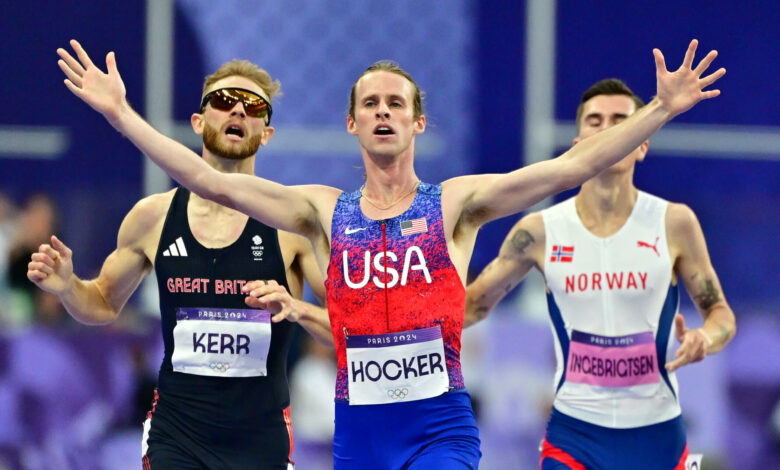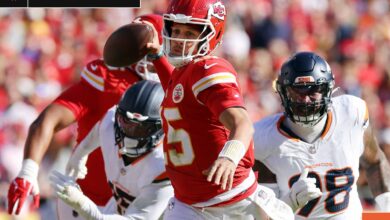How the Ingebrigtsen-Kerr 1500m rivalry was taken to new heights – even though no one won

If you had offered Josh Kerr a British record of 3 minutes 27 seconds before the Olympic final of the men’s 1500 metres and a guarantee that he would beat Jakob Ingebrigtsen, his eyes would have lit up.
His ubiquitous sunglasses might have hidden the excitement, but by beating his rival with a fast time, there was a good chance he would win Olympic gold.
Things turned out differently.

GO DEEPER
Cole Hocker stuns the world, winning gold in the men’s 1500 meters
If the post-Tokyo Olympics narrative reduced the 1500m to a Kerr-Ingebrigtsen clash, Tuesday night’s final proved there was a different story to be written. The men’s middle-distance running has never seen such depth.
Before the race, there had been 20 instances of athletes running a 1500m in under 3:28 — nine of them by Morocco’s world record holder Hicham El Guerrouj. This final marked the first time that three men had run 3:27 in the same race, and that’s excluding Ingebrigtsen, the only one who started the day having previously broken the 3:28 barrier.

Hocker shocked Kerr and Ingebrigtsen (Hannah Peters/Getty Images)
Ingebrigtsen broke his Olympic record in Paris. The only problem was that three boys were faster than him: champion Cole Hocker (3:27.65), silver medalist Kerr (3:27.79) and bronze medalist Yared Nuguse (3:27.80), who was seventh, eighth and ninth on the list of fastest 1500m runners ever. Nuguse and Hocker were not even born when El Guerrouj set his world record of 3:26.00 in 1998.
Fastest 1500m athletes of all time
| Athlete | Time | Nationality | Date |
|---|---|---|---|
|
Hicham El Guerrouj |
03:26.00 |
Morocco |
July 1998 |
|
Bernard Lagat |
3:26.34 |
Kenya/USA |
August 2001 |
|
Asbel Kiprop |
3:26.69 |
Kenya |
July 2015 |
|
Jakob Ingebrigtsen |
3:26.73 |
Norway |
July 2024 |
|
Noureddine Morceli |
3:27.37 |
Algeria |
July 1995 |
|
Silas Kiplagat |
3:27.64 |
Kenya |
July 2014 |
|
Cole Hocker |
3:27.65 |
US |
August 2024 |
|
Josh Kerr |
3:27.79 |
Great Britain |
August 2024 |
|
Yared Nuguse |
3:27.80 |
US |
August 2024 |
|
Noah Ngeny |
3:28.12 |
Kenya |
August 2000 |
The 1500m has seen eight different medallists at the last three world championships (in 2019, 2022 and 2023), with Kerr the only athlete to win a medal at both the Tokyo and Paris Olympics, improving on his bronze from three years ago. Of the 13 men who reached the final in Tokyo, only four reached the final in Paris: Ingebrigtsen, Kerr, Timothy Cheruiyot and Hocker.
The problem is that the rivalry between Kerr and Ingebrigtsen is becoming increasingly hypothetical and fueled more by what isn’t happening than anything else.
Kerr is not much of a circuit racer. He did not run the 1500m in 2024 for the Games, which meant he missed the European Championships in June, which Ingebrigtsen won in 3:31.95. Kerr opted for the 800m at the British Championships for what he described as a bigger tactical test with less room for error.
That ended in disaster when he tried to hit the inside of Elliot Giles on the straight, just as Hocker did in Paris, sending the two flying through the air.
CHAOS in the men’s 800m!!
🥇 @BenPattison7 1:45.49
🥈 @MaxBurgin3 1:46.01
🥉 @MclearFinley 1:46.33 photo.twitter.com/7etVXCX125— British Athletics (@BritAthletics) June 30, 2024
Kerr has no need for the rhythm of races, while Ingebrigtsen is a frequent visitor to the Diamond League circuit. Give him pacemakers and wavelights and he can chase any record — he ran a 3:26 1500m in Monaco last month.
Ingebrigtsen is tactically astute and can move between distances. He is a two-time world champion in the 5,000 meters and holds the world record in the two miles (7:54.10). However, he has not won any of the last three world finals in the 1500 meters: Wightman beat him in Eugene in 2022, Kerr in Budapest in 2023 and Hocker in Paris. Ingebrigtsen at least had the consolation of silver in 2022 and 2023.
Tuesday makes it three victories for Kerr over Ingebrigtsen in their last four meetings, with the Norwegian winning only the 1500m semi-final heat in Paris. Kerr was better than him at the Prefontaine Classic in Eugene in May when he broke Steve Cram’s 39-year-old British mile record. That day, Kerr kicked with 600m to go and held off Ingebrigtsen.
Ingebrigtsen clearly did not want to play to Kerr’s strengths with a sit-and-kick like at the 2023 World Championships, which ended in a time of 3:29, while the first 800 meters had been run in 1:54.
Ingebrigtsen rode the Olympic final as a time trial. In theory, it played to his strengths and forced Kerr to run better than ever before. The risk? Ingebrigtsen had to play it perfectly or the wheels would fall off.

Ingebrigtsen went wild in Paris (Ian MacNicol/Getty Images)
“It was 100m too long. It’s not always easy to use your energy wisely,” Ingebrigtsen told Eurosport after the race. “The pace is so high the whole race, especially because I start so strong, you can’t really see 100 percent when you hit the wall before you hit it.”
His Diamond League performance is a unique race. Show up, run, go home. It’s not the same as championship racing, physically or mentally, with three races in four days.
“I felt strong the first few laps,” Ingebrigtsen said. “I struggled to set the pace because it was quite fast. It was hard to slow down. I could see that I was starting to get a gap, so I kept pushing.”
He took 54.9sec and 56.6sec in his first two laps to go through the 800 in 1:51.5 — 2.5sec faster than Budapest in 2023. Ingebrigtsen led for 1400m of the 1500m. He was his own pacesetter. It wasn’t his trademark wind-up where every 100m gets imperceptibly faster. This was more of a rush, something out of the playbook of Kenya’s Mary Moraa.
Laps one and three were faster than lap two. Hocker and Nuguse came from far away and got faster (relatively speaking at least) every 100m from 600m. Hocker closed faster. Ingebrigtsen seemed to try to run Kerr’s kick early, not even willing to get into a situation where the gold was reduced to a 200m shootout.

Hocker timed his kick perfectly (Ian MacNicol/Getty Images)
He had the field 500m apart. Athletes considered running in lane two to avoid being hemmed in by the curb, but immediately changed their minds when they saw how fast it was going and knew they couldn’t afford to run an extra distance.
Kenyan Brian Komen was Ingebrigtsen’s equal for two laps, but finished last when the Norwegian took him out after an 800-meter sprint. That’s usually what happens in the Diamond League. To Ingebrigtsen’s credit, he took a chance. It was more brave than reckless. That’s the style of racing required to break a world record that has stood for 26 years.
The problem is that the margin of risk is higher than when you make it tactical and slower. When this kind of racing goes wrong, it really goes wrong. Ingebrigtsen got stuck on the straight, fought harder, slowed down and lost all form, and closed the last 100m in 13.8 sec. For comparison, Hocker and Nuguse closed in 13 sec. and Kerr in 13.2 sec. He also got stuck, just a little bit closer to the finish.
Ingebrigtsen’s plan seemed as likely to be that he would win as that Kerr would lose. At the bell, the three eventual medalists were in third through fifth place. Ingebrigtsen glanced over his shoulder twice on the final straight. It’s generally a sign of fear and an indication that an athlete is hitting the wall, and it’s something you never see from him.
Kerr had run the 1200m of his life, proving (again after Eugene) that he could compete in races that started hard. He split the race into 15 100m sessions and the only marker where he wasn’t in the top three was 700m, and even then he came fourth.
Here are the splits for that 1500m… absolutely insane…
1:51.5 to 800…
Look at that last 300… 13.3, 13.3, 13.0… That’s 39.6 of a HARD pace for Cole Hocker.
USA 1-3-5 is awesome.
Jacob couldn’t help it. The other boys were better today. photo.twitter.com/rklq99zrV9
— Steve Magness (@stevemagness) August 6, 2024
“I’m so proud of myself. I ran the best 1500m race ever, on the biggest stage, by over a second,” Kerr told Eurosport. “It’s hard to control what someone else does, but I controlled myself, I positioned myself well to win and to get medals. It wasn’t enough in the last 20 or 30 metres, but I got beaten by the better man. I have to walk away with my head held high.”
Kerr went wide in the final corner when he tried to pass Ingebrigtsen. Those few extra metres are probably the only thing he regrets about the race. He finally caught him with about 60m to go, but then something very unexpected happened.
Ingebrigtsen ran ever so slightly diagonally to cut Kerr and force him wider in a last-ditch effort to stay first. This left the inside of lane one, near the curb, empty. Hocker ran straight in and took gold. Kerr won the battle against Ingebrigtsen, but not the war, and in his desperate attempt to beat Kerr, the reigning champion surrendered his crown by beating Hocker and breaking the Olympic record he had set three years earlier.

Hocker celebrates his victory as he crosses the finish line ahead of Kerr and Nuguse (Richard Heathcote/Getty Images)
Kerr spoke to the BBC afterwards about “being consistent at this level” and maintaining success at major championships. That silver medal is his fourth in as many years. Ingebrigtsen’s medal haul still dwarfs Kerr’s — ending a run of 17 international competitions in which the Norwegian had finished on the podium, dating back to the 2019 World Championships.
Yet the pattern now is three world 1500m finals where Ingebrigtsen has been defeated. Kerr is still the better of the two when it comes down to it.
In 13 months they will compete again at the World Athletics Championships in Tokyo and possibly also at the European Indoor Athletics Championships in March in the Netherlands.
This isn’t over yet, it’s just beginning.
(Top photo: Christian Liewig – Corbis/Corbis via Getty Images)




